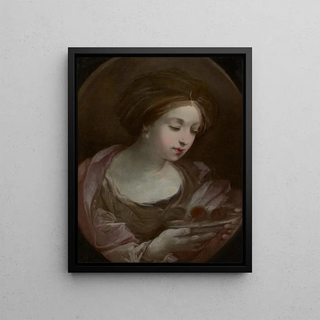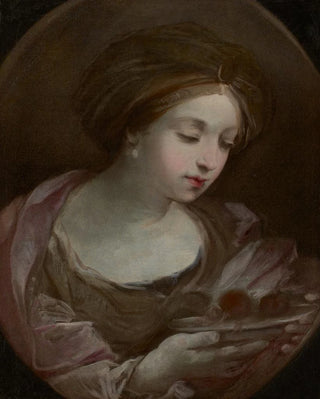Art print | Bust of a woman wearing a turban - Guido Reni


View from behind

Frame (optional)
In the fascinating world of baroque art, few works manage to capture the essence of feminine beauty with such finesse as Guido Reni's "Art print of a woman wearing a turban." This iconic piece, which transcends time and eras, invites viewers to immerse themselves in a universe where sensuality blends with spirituality. Through the delicate features of this bust, the artist evokes an emotional depth that still resonates today. The depiction of a woman with a turban, a symbol of mystery and elegance, transports us on a captivating visual journey, where every detail seems to tell a story.
Style and uniqueness of the work
Guido Reni's style is distinguished by his ability to combine realism and idealization. In the "Art print of a woman wearing a turban," light plays a crucial role, subtly illuminating the contours of the face and highlighting the delicate texture of the skin. The eyes, imbued with gentle melancholy, seem to scrutinize the viewer's soul, while the richly draped turban adds a dimension of mystery and elegance. This piece is a perfect example of Reni's mastery in the use of colors, where warm and rich tones blend to create an atmosphere that is both intimate and captivating. Every brushstroke is an ode to beauty, revealing an artistic sensitivity that continues to inspire art lovers.
The artist and his influence
Guido Reni, an emblematic figure of Italian baroque, knew how to mark his era with his unique style and artistic vision. Born in Bologna in 1575, he was influenced by the great masters of the Renaissance, while developing a distinctive approach. His works, often imbued with spirituality, testify to a constant pursuit of ideal beauty. Reni established himself as one of the most respected painters of his time, influencing not only his contemporaries but also future generations. His impact is felt in the art world, where his approach to light and color continues to be studied and admired. The "Art print of a woman wearing a turban"

Matte finish

View from behind

Frame (optional)
In the fascinating world of baroque art, few works manage to capture the essence of feminine beauty with such finesse as Guido Reni's "Art print of a woman wearing a turban." This iconic piece, which transcends time and eras, invites viewers to immerse themselves in a universe where sensuality blends with spirituality. Through the delicate features of this bust, the artist evokes an emotional depth that still resonates today. The depiction of a woman with a turban, a symbol of mystery and elegance, transports us on a captivating visual journey, where every detail seems to tell a story.
Style and uniqueness of the work
Guido Reni's style is distinguished by his ability to combine realism and idealization. In the "Art print of a woman wearing a turban," light plays a crucial role, subtly illuminating the contours of the face and highlighting the delicate texture of the skin. The eyes, imbued with gentle melancholy, seem to scrutinize the viewer's soul, while the richly draped turban adds a dimension of mystery and elegance. This piece is a perfect example of Reni's mastery in the use of colors, where warm and rich tones blend to create an atmosphere that is both intimate and captivating. Every brushstroke is an ode to beauty, revealing an artistic sensitivity that continues to inspire art lovers.
The artist and his influence
Guido Reni, an emblematic figure of Italian baroque, knew how to mark his era with his unique style and artistic vision. Born in Bologna in 1575, he was influenced by the great masters of the Renaissance, while developing a distinctive approach. His works, often imbued with spirituality, testify to a constant pursuit of ideal beauty. Reni established himself as one of the most respected painters of his time, influencing not only his contemporaries but also future generations. His impact is felt in the art world, where his approach to light and color continues to be studied and admired. The "Art print of a woman wearing a turban"






